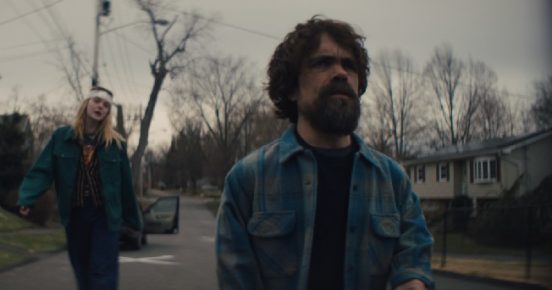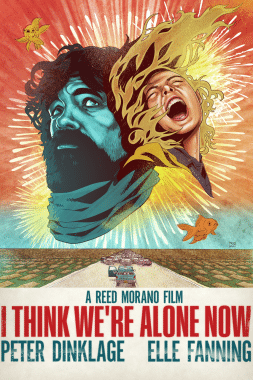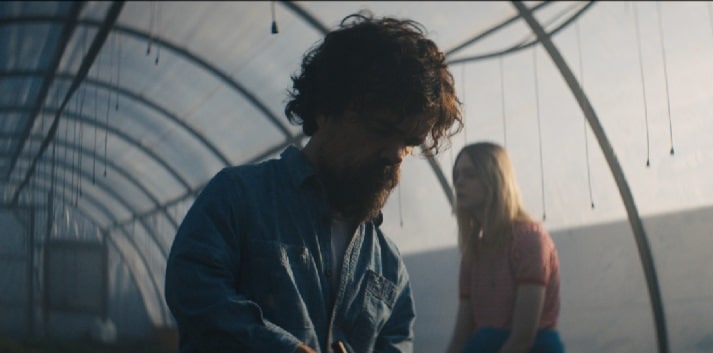 Whilst for many of us post-apocalyptic narratives may be synonymous with zombies and/or marauding biker gangs in extravagant costumes, pare it back and they typically come down to the same key idea: being the last person alive in a world that is no more. From Robert Neville of Richard Matheson’s I Am Legend, to Max Rockatansky in George Miller’s Mad Max series, any self-respecting post-apocalyptic story tends to come down to one person, or a small group of people, doing what they can to stay alive, all on their own. Then, when invariably it comes to light that they are not in fact the last living soul on Earth, the question soon arises as to whether they might have been better off if they had been; Hell is other people, after all. So it is in I Think We’re Alone Now, director Reed Morano’s understated drama about solitude, survival and the difficulty of human relationships. Bronx Warriors this ain’t.
Whilst for many of us post-apocalyptic narratives may be synonymous with zombies and/or marauding biker gangs in extravagant costumes, pare it back and they typically come down to the same key idea: being the last person alive in a world that is no more. From Robert Neville of Richard Matheson’s I Am Legend, to Max Rockatansky in George Miller’s Mad Max series, any self-respecting post-apocalyptic story tends to come down to one person, or a small group of people, doing what they can to stay alive, all on their own. Then, when invariably it comes to light that they are not in fact the last living soul on Earth, the question soon arises as to whether they might have been better off if they had been; Hell is other people, after all. So it is in I Think We’re Alone Now, director Reed Morano’s understated drama about solitude, survival and the difficulty of human relationships. Bronx Warriors this ain’t.
Peter Dinklage is Del, seemingly the sole survivor of a mysterious pandemic or otherwise unexplained occurrence which wiped out all other life in his small town. Timelines are never clear, but it would certainly seem to have been quite some time, as Del keeps himself busy systematically cleaning up the town house by house, burying all the bodies he finds, salvaging whatever he can find of use (primarily batteries), and respectfully leaving things as pristine as he can. Evidently he’s been at this a while, as once he’s cleaned house he marks the road outside, and the appropriate space on his own map with a white X – and there are Xs over a good portion of the town. Beyond this, Del occupies his time by maintaining the local library where he has also made his home, catching fresh fish (evidently they were unaffected by whatever it was that killed all the land animals), reading his beloved books, watching old movies, and – as clear an indicator as there ever was of a unabashed outsider – listening to nothing but Rush. As lonely a life as it may be, it seems to be a comfortable routine; one which is suddenly thrown off balance with the very unexpected arrival of Grace (Elle Fanning), a young woman who crashes her car nearby. After Del has tended to her injuries, Grace tells him that she too is all alone, and – pleased to have at last found human contact – she’s keen to stay, and help Del in his work cleaning the houses. Reluctantly Del agrees, but it’s apparent straight away that he may have been a great deal happier as a hermit.
 Given that he’s arguably the best-loved actor in arguably the best-loved TV show of recent years, the presence of Peter Dinklage in the lead is clearly the main selling point of I Think We’re Alone Now. It’s an interesting choice for the actor, as Del is a total 180 degree turn from Tyrion Lannister. Where the Game of Thrones character enjoys the company of others almost as much as he enjoys the sound of his own voice, Del is a total introvert who doesn’t make a sound if he can help it, and clearly struggles when forced to interact with another human being. It only makes things harder that Elle Fanning’s Grace is such a polar opposite to him; far younger, considerably more outgoing, rather less concerned with being neat, tidy, quiet and orderly. This essential set-up – an uptight, lonely individual forced to confront their feelings when a bold free spirit enters the life – is very familiar territory, and, via such indie dramas as Buffalo 66 and Garden State, it tends to walk hand-in-hand with the dreaded Manic Pixie Dreamgirl archetype, which Fanning’s Grace could clearly qualify as. This being the case, as there’s a clear age gap between the two leads, it would be very easy for things to get a tad bit creepy. Happily, for the most part this is avoided, with any sense of this being a lonely male wish fulfilment story being kept to a minimum; the temptation is there to attribute this to the fact that director and cinematographer Reed Morano is female (probably best known for her work on another noted TV series, The Handmaid’s Tale), although we can’t fail to note that the screenwriter Mike Makowsky is not.
Given that he’s arguably the best-loved actor in arguably the best-loved TV show of recent years, the presence of Peter Dinklage in the lead is clearly the main selling point of I Think We’re Alone Now. It’s an interesting choice for the actor, as Del is a total 180 degree turn from Tyrion Lannister. Where the Game of Thrones character enjoys the company of others almost as much as he enjoys the sound of his own voice, Del is a total introvert who doesn’t make a sound if he can help it, and clearly struggles when forced to interact with another human being. It only makes things harder that Elle Fanning’s Grace is such a polar opposite to him; far younger, considerably more outgoing, rather less concerned with being neat, tidy, quiet and orderly. This essential set-up – an uptight, lonely individual forced to confront their feelings when a bold free spirit enters the life – is very familiar territory, and, via such indie dramas as Buffalo 66 and Garden State, it tends to walk hand-in-hand with the dreaded Manic Pixie Dreamgirl archetype, which Fanning’s Grace could clearly qualify as. This being the case, as there’s a clear age gap between the two leads, it would be very easy for things to get a tad bit creepy. Happily, for the most part this is avoided, with any sense of this being a lonely male wish fulfilment story being kept to a minimum; the temptation is there to attribute this to the fact that director and cinematographer Reed Morano is female (probably best known for her work on another noted TV series, The Handmaid’s Tale), although we can’t fail to note that the screenwriter Mike Makowsky is not.
Still, whether we’re considering it as a last man alive tale or an introverted male meets extroverted female story, I’m not sure I Think We’re Alone Now really brings much new to the table. Obviously it helps having two such strong actors in the roles (Fanning may often be a trifle annoying, but that’s clearly the whole point), but even so it’s a well-trod path on which we don’t really find any especially unique turns. There are moments which allude to bigger, more interesting things going on, but for the most part these are left to the sidelines; as much as this is understandable, given the clear intent on telling what is first and foremost a human story, it’s hard not to feel just a little more meat on the bone wouldn’t have hurt.
And finally, as regards the title: while there’s a clear logic to it, given the condition of our protagonists, I do find it a bit odd that a film which is for most part so stony and straight-faced chooses to take its name from a quaint bubblegum pop song. This would seem to hint at a sense of knowing humour which, for the most part, is notable by its absence here.
I Think We’re Alone Now is available in the UK on VOD on 19th November, via The Movie Partnership.
